Eight Chemistry Faculty Recently Promoted
We are celebrating the promotion of eight of our faculty who worked hard and still are dedicating time and effort to serve the students, the community, and research at NC State.
Jeremiah Feducia, Teaching Professor
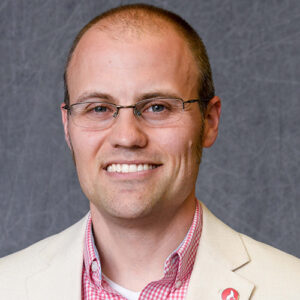
Since joining the faculty in 2008, Dr. Jeremy Feducia has excelled in his contributions to the Department inside and outside of the classroom. Central to his teaching philosophy is the idea that faculty, and the courses they teach, should act as a bridge to a student’s success, not a barrier. He was recently recognized with an Alumni Association Outstanding Teaching Award for his exceptional and effective teaching in the classroom. Outside of teaching in the General and Organic Chemistry curriculum, he also created a unique interdisciplinary course, Chemistry and War, in collaboration with faculty in History. Outside of the classroom, he is an avid advocate for the students that are in the Department. Through advising and mentoring all first-year and transfer Chemistry students, he has helped to create a welcoming community for students in Chemistry and has been recognized for these efforts with the Advocacy Award from the College of Sciences as well as an Outstanding Faculty Advisor Award from the National Academic Advising Association. In addition to these roles, he continues to be active with our chapter of Alpha Chi Sigma and has helped to establish science education outreach programs such as STARS (Science and Technology Activities in Rural Schools) and the NCSU Merit Badge College. In the near future, Dr. Feducia will be integral to the curricular and program development within the Integrative Sciences Initiative and recently was announced as a Park Faculty Scholar for the Class of 2028.
Ana Ison, Teaching Professor
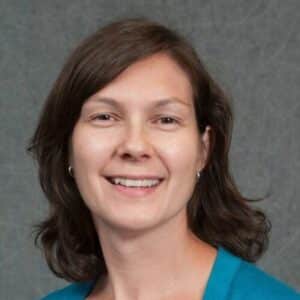
Over the past 17 years, Dr. Ana Ison has taught general chemistry courses and advanced synthesis labs. She worked on developing and currently directs both the general chemistry labs for majors and the advanced synthesis labs. This has allowed her to work with both incoming chemistry majors as well as junior/senior majors. She also serves as the director of the Chemistry Honors Program. She really enjoys all of these roles as they allow her to see students blossom and grow throughout their four years in the program. Lastly, she has been involved with the departmental DEI committee and the MentorUP program where members connect incoming students with junior/senior-level students to help encourage them to connect and form a community of support in the department. On a personal note, Dr. Ison loves reading, gardening, traveling, hiking and backpacking!
Elon Ison, Professor
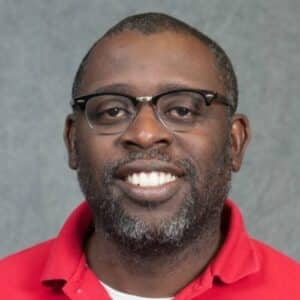
Dr Elon Ison is a citizen of Trinidad and Tobago and the United States. He received his B.S. degree (Kean University) in 1999 and conducted undergraduate research in organic synthesis and computational chemistry under the direction of Dr. Dale Vitale. In the fall of 1999, Elon moved to the University of Florida where he began his Ph.D. studies under the mentorship of Dr. James Boncella. He received his Ph.D. in Organometallic Chemistry in 2004, and then moved to West Lafayette Indiana to pursue post-doctoral studies in the labs of Dr. Mahdi Abu-Omar. In the fall of 2006, Elon began his independent research career in the area of Catalysis/Organometallic Chemistry at North Carolina State University. He received the ORAU Ralph E Powe Award, in 2009, the NSF CAREER Award in 2010 and was named an Organometallics Fellow in 2012. He is married to his wife Ana and has two children Mya and Luka.
Vincent Lindsay, Associate Professor with Tenure
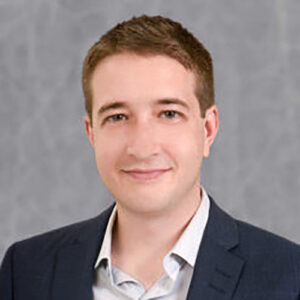
Dr. Vincen Lindsay developed a nationally recognized, NIH-funded research program involving the discovery and application of novel synthetic methods using compounds of extreme strain. In particular, he and his team have developed the first enantioselective route to notoriously unstable cyclopropanone derivatives, which can now be routinely utilized as high-energy building blocks in a wide variety of novel synthetic disconnections. Under his mentorship, 6 NCSU graduate students have so far graduated with a Ph.D. Dr. Lindsay has also been effectively teaching CH755 (Organic Reaction Mechanisms, first-year graduate class) and CH223/CH227 (Organic Chemistry II, sophomore undergraduate) in our department for the past 7 years. He has also served on multiple hiring committees within the department, acts as a reviewer for >30 chemistry journals and societies, and served as NSF REU mentor (5 summers) and ACS Project SEED (3 summers) for a number of curious undergraduate researchers eager to learn about organic synthesis. He has also served on the Graduate Admission Committee as well as the Department Safety Committee since he started in 2016.
Marion Martin, Associate Teaching Professor
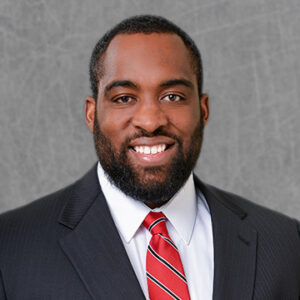
Dr. Marion Martin hopes his work reflects a kindness rooted in respecting the dignity of every human being. He is committed to improving the lived experience of all members of our department. For example, Dr. Reza Ghiladi and he participated in the 3-day Career and Occupational Mentoring for the Professional Advancement of Science Students (COMPASS) Faculty Workshop in April 2019. They implemented many of the changes they developed in our action plan in CH 610G Introduction to Graduate Studies – Professional Development, including mentee training and a session led by OIED on Diversity, Equity and Inclusivity, Bias Training, and Microaggressions. Additionally, he has served as the inaugural chair of the Chemistry Department’s Diversity, Equity, and Inclusion Committee. He recruited faculty, graduate students, postdoctoral scholars, staff, and undergraduates to serve. After leading the committee through several sessions as a large group to build comradery and a shared vision, the subcommittees worked to develop short-term and long-term SMART goals. [Specific, Measurable, Achievable, Relevant, Timely] One activity that has come out of these efforts is the DEI Colloquium Series that occurs each term. These seminars have been well received and have generated conversations around important issues affecting minoritized communities.
Caroline Proulx, Associate Professor with Tenure
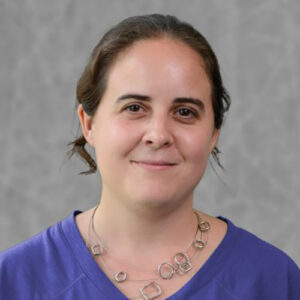
Research in the Proulx lab is centered on the development of new methods for the mimicry and late-stage functionalization of peptides and peptidomimetics, with applications in medicinal chemistry. Dr. Caroline Proulx and her group have developed N-aryl peptides as novel precursors for peptide ligations, which was funded by an NSF CAREER award in 2021. Her work on the synthesis and conformational analysis of other hydrazine-containing peptidomimetics (e.g. peptoids and azapeptides) was funded by an NIH R35 Maximizing Investigators’ Research Award (MIRA) for Early Stage Investigators. Dr. Proulx’s contributions to peptide science have also been recognized by an Early Career Lectureship from the American Peptide Society. Over the past seven years, Prof. Proulx has mentored several graduate, undergraduate, and high school students, including Chemistry of Life trainees and a Beckman scholar in collaboration with Prof. Simpson (Biochemistry). She has participated in the NSF-REU program every summer since 2017 and the ACS Project SEED for 3 summers. In the classroom, Prof. Proulx has taught both graduate students (CH 721: Advanced Organic Chemistry I) and undergraduate students (CH 223: Organic Chemistry 2 and, more recently, CH 495: Organic Chemistry 3). She co-taught CH 610G ‘Introduction to Graduate Studies’ with Prof. Fourches for 3 years. For her teaching excellence, she received the LeRoy and Elva Martin Award in 2020. She has also recently received the Goodnight Early Career Innovator Award, which supports early career faculty excellence.
Ghada Rabah, Teaching Professor
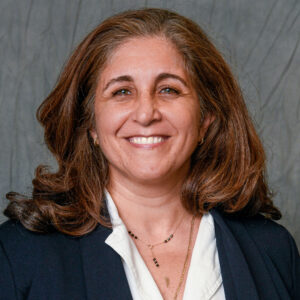
Since Dr. Ghada Rabah started at NC State, she has taught a number of different courses (CH 100, CH 101, CH 315, CH316, CH 415, CH 452, and CH 454) which varied in student makeup and class setting. The experience of teaching such a varied course catalog has been challenging but rewarding at the same time as it gave her an up-close view of the chemistry curriculum and the skills of the students along the way. She has also been assuming managerial responsibilities for the analytical teaching labs. She strongly believes that teaching laboratory spaces has a great impact on student engagement and job-readiness, and she is constantly seeking and securing opportunities to update laboratory equipment and space.
She always strives to identify, develop and employ impactful instructional material and methods that aim to improve student learning. Students are graduating into an increasingly interdisciplinary market, and traditional curricula must evolve to fully prepare them to effectively address multifaceted problems. Over the last several years, Dr. Rabah has been motivated by the successes of the engineering senior design model to seek out collaborative research projects with faculty across campus and integrate teaching and research experiences in our upper-level chemistry labs. These course-based undergraduate research experiences (CUREs) offer a venue to extend the benefits of undergraduate research to all students and as such make scientific research more inclusive. Furthermore, engagement in authentic research experiences with uncertain and unknown outcomes teaches the students to overcome failures and setbacks and to problem solve. In addition to strengthening students’ disciplinary knowledge and skills, the collaborative interdisciplinary CURE approach aims to prepare them to work and converse across disciplines.
Dr. Rabah has been recently appointed as a Dean’s Faculty Fellow and she is very excited about the opportunity to work with the Academic Affairs Office and colleagues from across campus to continue to develop the upper level CURE program and to support the expansion of collaborative and multidisciplinary curricula opportunities for all students.
In addition to her teaching and lab management roles, she has been serving as an academic advisor to an average of ten chemistry students per semester. She has also always welcomed opportunities to serve on department, college and university committees that are tasked to advise on matters related to curricular development, instruction and safety.
Thomas Theis, Associate Professor with Tenure
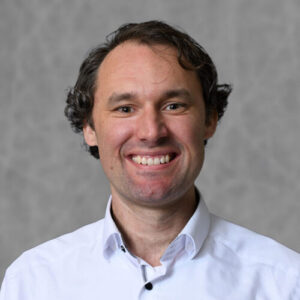
Dr. Theis joined the NC State Department of Chemistry in 2018. He established the NC State Hyperpolarization Lab, where he and his team of postdocs, graduate and undergraduate students develop hyperpolarization chemistry to enhance the utility of NMR (Nuclear Magnetic Resonance) and MRI (Magnetic Resonance Imaging). Theis’ hyperpolarization chemistry allows for tracking of metabolic transformations in organs for early detection of metabolic diseases such as cancer or cardiovascular disease. The hyperpolarization technology also enables precision measurements of chemical structures with unprecedented limits of detection.
Since joining in 2018, Dr. Theis’ research has been recognized by over 15 local, national, and international awards and prizes. Outside of research, Dr. Theis has advanced NC State’s global engagement by establishing a large array of international collaborations, which was recently recognized by the Friedrich-Wilhelm Bessel Award from the Humboldt Foundation. In his classes, Dr. Theis teaches all aspects of physical chemistry, including quantum mechanics, statistical mechanics, kinetics, thermodynamics, and spin physics. The students rave about his classes with comments like: “I have never seen someone teach chemistry/physics topics so well such that students actually understand what is being taught.”
Dr. Theis also has been providing significant service to the department by serving on several committees and acting as the Director of Entrepreneurship within the NC State Comparative Medicine Institute and College of Science Dean’s Fellow, organizing Research-Triangle-wide conferences and programs focused on Entrepreneurship and Commercialization called CATALYZE. Dr. Theis also has launched a start-up company that has received numerous awards, including the Daugherty Awards, that bridge pure research and product commercialization.
In his free time, Dr. Theis enjoys learning to play the saxophone, playing tennis, biking and wing foiling.
This post was originally published in Department of Chemistry.